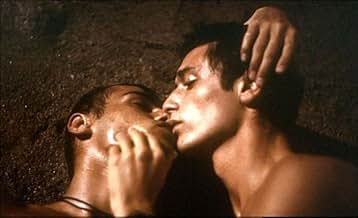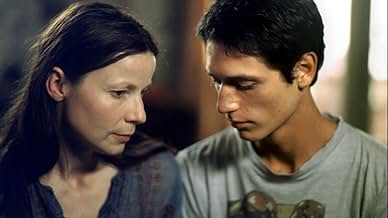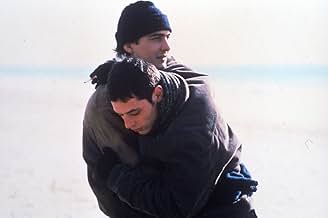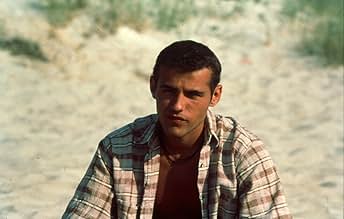Mathieu, 18 anni, trascorre l'estate nella casa estiva di sua madre, in Bretagna. Sulla spiaggia incontra Cédric, un ragazzo della sua età. Inizia una storia d'amore tra i due ragazzi.Mathieu, 18 anni, trascorre l'estate nella casa estiva di sua madre, in Bretagna. Sulla spiaggia incontra Cédric, un ragazzo della sua età. Inizia una storia d'amore tra i due ragazzi.Mathieu, 18 anni, trascorre l'estate nella casa estiva di sua madre, in Bretagna. Sulla spiaggia incontra Cédric, un ragazzo della sua età. Inizia una storia d'amore tra i due ragazzi.
- Regia
- Sceneggiatura
- Star
- Premi
- 1 candidatura in totale
- Mathieu
- (as Jeremie Elkaïm)
- Cédric
- (as Stephane Rideau)
- La psychiatre
- (as Rejane Kerdaffrec)
Recensioni in evidenza
The film's fractured narrative -- which is comprised of lengthy flash-backs, bits and pieces of the present, and real-time forward-movement into the future -- is a little daunting. Director Sebastien Lifshitz doesn't signal which time-period we are in, and the story line can be difficult to follow. But stick it out: The film's final 45 minutes are so engrossing that you won't be able to take your eyes off the screen. By turns heart-breaking and uplifting, this film ranks with "Beautiful Thing" as must-see cinema.
Told by director Sebastian Lifshitz and writers Stephane Bouquet and Lifshitz through a series of vignettes--often presented in a nonsequential timeline--the unfoldment provides some work on the part of the viewer to position these disjointed fragments together.
However, the basic scenario is so simple that the unfoldment does unite in post-reflection. It is an interesting tale, made plausible by two fine performances by the leads.
Jeremie Elkaim as Matthiew evokes a slightly moody, troubled youth, longing for affection, and willing to give of himself in a new relationship. Elkaim's work beautifully conveys Matthiew's need for companionship and for escape from a staid and mundane domestic environment.
Stephane Rideau presents yet another of his remarkable performances as Cedric. Rideau immerses himself in the role so skillfully that his craft brilliance is taken for granted. As close to the late James Dean as has been seen recently, Rideau takes his place in the Alain Delon legacy as one of France's leading young actors. Rideau possesses an arresting countenance: even his pointed ears, protruding chin, an off-centered eye, and crooked lips seem to contribute to his handsomeness. His Cedric is non-intellectual, expressing primitive emotions in his approach to life; yet, his ardor for Matthiew rings undeniably genuine and true.
The rest of the cast of "Presque rien" contribute to this slice-of-life tale, and we are pleased to have an opportunity to glimpse fragments of a both playful and poignant summertime romance.
If you haven't seen the film, perhaps you would like to stop reading.
Sebastien Lifshitz, the director of the film, has told his story from Mathieu's viewpoint. Most viewers appear to be disoriented by the different times within the film, but there are hints that are not obvious, as one can see, in retrospect. The story is told in flashbacks that might add to the way some people will view the film. This is a story about the doomed the love Mathieu felt for Cedric and the ultimate breakdown of their life together.
First of all, Cedric, the handsome young local, pursues Mathieu until he succeeds in convincing him he likes him. Mathieu feels the attraction for Cedric too. We realize how different both young men are by the way Cedric tells Mathieu's family how he feels school is not for him. On the other hand, Mathieu, who wants to be an architect, finds beauty in the abandoned place where Cedric has taken him. We watch as Mathieu, reading from the guide book, wants Cedric's attention.
When Mathieu comes out to his mother, she wisely tells him about the importance of continuing his career. She also points out about what future both of them would have together, which proves to be true. Mathieu appears to have learned his lesson, the hard way. He goes on to an uncertain life with Cedric and attempts to take his own life. We watch him in the hospital speaking to a psychiatrist that has treated his wounded soul.
The ending might be confusing for most viewers, but there is a moment in the film when Mathieu goes to work in a bar where we see him washing glasses and looking intently to Pierre, the young man who frequents the bar. That is why when Mathieu goes looking for Pierre at his house, appears to be hard to imagine. Yet, we have seen the way Mathieu is obviously interested in Pierre. The last scene at the beach, when Pierre and Mathieu are seen strolling in the sand, has a hopeful sign that things will be better between them as they watch a young boy, apparently lost, but then realizing the father is nearby.
Jeremie Elkaim makes Mathieu one of the most complex characters in recent films. This is a young man who is hard to understand on a simple level. Mathieu has suffered a lot, first with the separation of his parents, then with his depressed mother and with losing Cedric. Stephan Rideau, who has been seen on other important French films, is equally good, as the shallow Cedric.
While "Come Undone" will divide opinions, the film deserves a viewing because of the complexity and the care Sebastien Lifshitz gives to the story.
Mathieu (handsome and gifted Jérémie Elkaïm) is visiting the seaside for a holiday, a time to allow his mother (Dominique Reymond) to struggle with her undefined illness, cared for by the worldly and wise Annick (Marie Matheron) and accompanied by his sister Sarah (Laetitia Legrix): their distant father has remained at home for business reasons. Weaving in and out of the first moments of the film are images of Mathieu alone, looking depressed, riding trains, speaking to someone in a little recorder. We are left to wonder whether the unfolding action is all memory or contemporary action.
While sunning at the beach Mathieu notices a handsome youth his age starring at him, and we can feel Mathieu's emotions quivering with confusion. The youth Cédric (Stéphane Rideau) follows Mathieu and his sister home, continuing the mystery of attraction. Soon Cédric approaches Mathieu and a gentle introduction leads to a kiss that begins a passionate love obsession. Mathieu is terrified of the direction he is taking, rebuffs Cédric's public approaches, but continues to seek him out for consignations. The two young men are fully in the throes of being in love and the enactment of the physical aspect of this relationship, so very necessary to understanding this story, is shared with the audience in some very erotic and sensual scenes. Yet as the summer wears on Mathieu, a committed student, realizes that Cédric is a drifter working in a condiment stand at a carnival. It becomes apparent that Cédric is the Dionysian partner while Mathieu is the Apollonian one: in a telling time in architectural ruin Mathieu is excited by the beauty of the history and space while Cédric is only interested in the place as a new hideaway for lovemaking.
Mathieu is a complex person, coping with his familial ties strained by critical illness and a non-present father, a fear of his burgeoning sexuality, and his nascent passion for Cédric. Their moments of joy are disrupted by Cédric's admission of infidelity and Mathieu's inability to cope with that issue and eventually they part ways. Time passes, family changes are made, and Mathieu drifts into depression including a suicide attempt. The manner in which Mathieu copes with all of these challenges and finds solace, strangely enough, in one of Cédric's past lovers Pierre (Nils Ohlund) brings the film to an ambiguous yet wholly successful climax.
After viewing the film the feeling of identification with these characters is so strong that the desire to start the film from the beginning now with the knowledge of the complete story is powerful. Lifshitz has given us a film of meditation with passion, conflicts with passion's powers found in love, and a quiet film of silences and reveries that are incomparably beautiful. The entire cast is superb and the direction is gentle and provocative. Lifshitz is most assuredly one of the bright lights of film-making. In French with English subtitles. Highly Recommended. Grady Harp
Lo sapevi?
- Citazioni
Cédric: [at the beach] Hey, Mathieu.
Mathieu: Please go away.
Cédric: Why?
Mathieu: So they don't see us together.
Cédric: Are you ashamed or what?
Mathieu: No, I just don't want any trouble.
Cédric: What trouble?
Mathieu: Can't you just leave?
Cédric: You think I'm stupid?
Mathieu: Just fuck off!
Cédric: What, fuck off?
- Colonne sonoreWise Mans Blues
Written by Perry Blake and Glenn Garrett
Performed by Perry Blake
From Perry Blake's album "Still Life"
Courtesy of Sony - ATV Music Publishing France
I più visti
- How long is Come Undone?Powered by Alexa
Dettagli
Botteghino
- Lordo Stati Uniti e Canada
- 326.484 USD
- Lordo in tutto il mondo
- 326.484 USD
- Tempo di esecuzione1 ora 40 minuti
- Colore
- Mix di suoni
- Proporzioni
- 1.85 : 1
Contribuisci a questa pagina
























